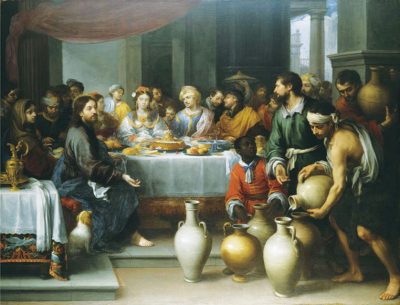 Readings:
Readings:
Isaiah 62:1–5
Psalm 96:1–3, 7–10
1 Corinthians 12:4–11
John 2:1–12
Think of these first weeks after Christmas as a season of “epiphanies.” The liturgy is showing us who Jesus is and what He has revealed about our relationship with God.
Last week and the week before, the imagery was royal and filial—Jesus is the newborn king of the Jews who makes us coheirs of Israel’s promise, beloved children of God. Last week in the liturgy we went to a baptism.
This week we’re at a wedding.
We’re being shown another dimension of our relationship with God. If we’re sons and daughters of God, it’s because we’ve married into the family.
Have you ever wondered why the Bible begins and ends with a wedding—Adam and Eve’s in the garden and the marriage supper of the Lamb (compare Genesis 2:23–24 and Revelation 19:9; 21:9; 22:17)?
Throughout the Bible, marriage is the symbol of the covenant relationship God desires with His chosen people. He is the groom, humanity His beloved and sought after bride. We see this reflected beautifully in today’s First Reading.
When Israel breaks the covenant, she is compared to an unfaithful spouse (see Jeremiah 2:20–36; 3:1–13). But God promises to take her back, to “espouse” her to Him forever in an everlasting covenant (see Hosea 2:18–22).
That’s why in today’s Gospel Jesus performs His first public “sign” at a wedding feast.
Jesus is the divine bridegroom (see John 3:29), calling us to His royal wedding feast (see Matthew 22:1–14). By His New Covenant, He will become “one flesh” with all humanity in the Church (see Ephesians 5:21–33). By our baptism, each of us has been betrothed to Christ as a bride to a husband (see 2 Corinthians 11:2).
The new wine that Jesus pours out at today’s feast is the gift of the Holy Spirit given to His bride and body, as today’s Epistle says. This is the “salvation” announced to the “families of nations” in today’s Psalm.














